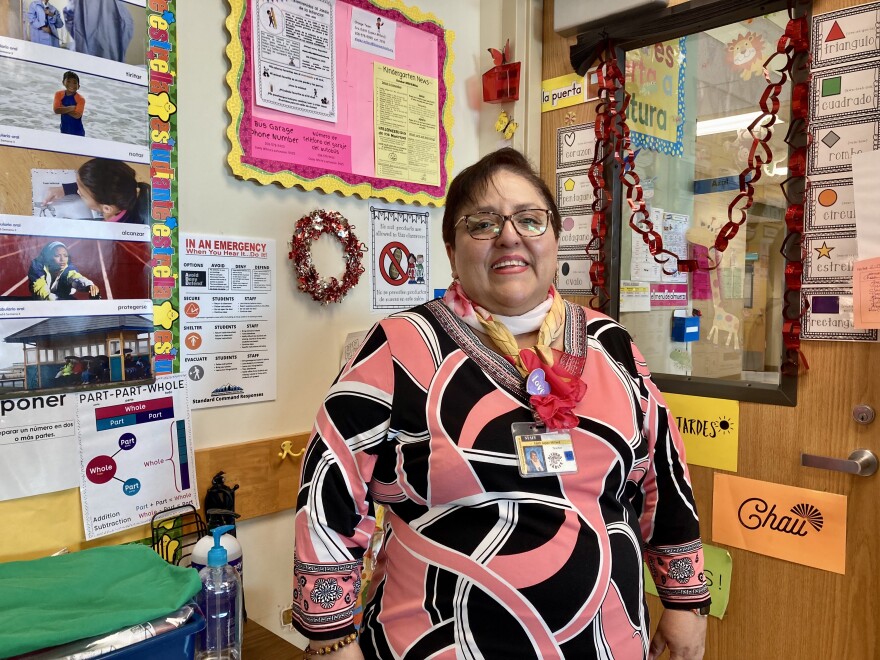Edith López-Millard is a leader at The Church of Jesus Christ of Latter-day Saints in Hailey, where people of various faith groups met one evening in January for an emergency meeting.
They were congregating to come up with a plan to help those who had recently arrived to the valley, many of them from Peru and without a permanent place to live.
A temporary overnight shelter would soon open and the churches were planning hot meals and coat drives.
López-Millard is from Peru herself. She came to Idaho nearly 30 years ago to continue her education. She's been a kindergarten teacher at Alturas Elementary School in Hailey for most of the time in between, where she teaches the Spanish half of a dual immersion program.
Several of her students were new to the valley, and some to the country, at the beginning of the school year, and more have joined her class every few weeks since. Some of her students are staying at the temporary shelter or in hotel rooms secured by local non-profits.
Boise State Public Radio visited her classroom to talk with her about how her role in the community has changed in the past year.
Read a transcript of the story below:
How it starts, we start with circle time. We do math, we do a little bit of Spanish, which is language arts in Spanish.
And then, yeah, we are getting ready to transition. They go to recess and lunch and then they switch languages. So they go to my partner, Ms. Teagan from 11:25 to 2:50.
So during the day I will see around 40 kids, 20 kids in the morning and then 20 kids the other half of the day. And after that, kids, they take the bus, some kids are picked up, but they have all their routines after school. They go skiing or they go to daycare or some of our kids go back to the shelter. Yeah. Where they are, you know, staying or the hotels that have been placed for their families.
I came to Idaho back in 2003, so my first spot of interest was Boise, because Boise State. My plan was to continue my education, to become a master's in bilingual education. So during the summer, investigating where I should be. And back then, people were saying that the best, you know, dual immersion programs was in Blaine County.
My first impression was this is going to be too cold. To be honest, I didn't know how to dress up for winter time, and I arrived in the month of January. So it was horrible, horrible in the terms of even with the jackets and sweaters and clothes that I brought from Peru, they never warm up my body. But my impression was it's going to be a long, cold winter.
I have a story of a family, a mom and dad and a boy who were coming from Peru all the way to the United States. And the Elder Missionaries told me, ‘Sister Millard,’ because that's how they call me in the church. ‘Sister Millard,’ there is a family coming from Utah to Hailey, and they were, you know, really scared, not knowing anyone. They were walking in the streets with backpacks and a sleeping bags, and they told me, ‘Can we meet in the church?’ So when they when I met them, they didn't have thick jackets and they were just with tennis shoes. And my first impression, it was, to be honest with you, I was tearing. Because that reminds me when I came for the first time up here, almost, what, 20 some years?
And I was, ‘Wow, no, I need to hands on, you know, do something for them.’ So we start, you know, getting jackets and second hand store clothing to them and feeding them. We talked to neighbors from other faiths, so they placed them in a studio. They were there for a week. They moved to a hotel and now they are in the shelter. So they feel safe in the shelter right now because, as you know, there is not too much housing here. There is no apartments and neither private, yeah, everything is limited right now in housing.
So my role as a teacher or as a leader in the community, yes, it has changed. I feel like my job in the morning at the school continues in the afternoon in my community. I go to the hotels, drop clothes or diapers for the little babies who are born. So when I go there, I see them and they, you know, they feel happy. They come, they come to see me, they hug me. Even over the weekends, I stop by, you know, And when I'm in the shelters, they call me ‘Tia,’ which is aunt. And it's a way, you know, it's a sweet way to say that we are related, but even we are not related, but they call me ‘Tia.’ ‘Hola, Tia.’ So, yeah, it's their way of connection with me.
Every time they come to the school, I feel that the school will be the safest place for these kids because at least they will have breakfast, they will have their lunch here. And we want to make, you know, Alturas Elementary School, for them, the coolest place in the planet. Because these kids, you know what they're facing either at their homes or the shelter or the hotels where they are staying, you know, for them, it's not it's not a stable situation for them. I wish and I hope that my students for the rest of the school year, they feel the same. They feel, you know, loved and that we care for them.
Find reporter Rachel Cohen on Twitter @racheld_cohen
Copyright 2023 Boise State Public Radio



